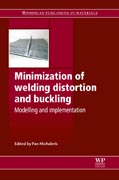
Minimisation of welding distortion and buckling: modelling and implementation
Michaleris, P.
Welding is a cost-effective and flexible method of fabricating large structures, but drawbacks such as residual stress, distortion and buckling must be overcome in order to optimize structural performance. Minimization of welding distortion provides a systematic overview of the methods of minimizing distortionand buckling in welded structures. Following an introductory chapter, Part 1 focuses on understanding welding stress and distortion, with chapters on such topics as computational welding mechanics, modelling the effect of phase transformations on welding stress and distortion and using computationally efficient reduced-solution methods to understand welding distortion. Part 2 covers different methods of minimizing welding distortion. Chapters discuss methods suchas differential heating for minimizing distortion in welded stiffeners, dynamic thermal tensioning, reverse-side heating and ways of minimizing buckling such as weld cooling and hybrid laser arc welding. With its distinguished editorand international team of contributors, Minimization of welding distortion isan essential reference for all welders and engineers involved in fabrication of metal end-products, as well as those in industry and academia with a research interest in the area. INDICE: Part 1 Understanding welding residual stress and distortion: Introduction to welding residual stress and distortion; Understanding welding stress and distortion using computational welding mechanics; Modelling the effects of phase transformations on welding stress and distortion; Modelling welding stress and distortion in large structures; Using computationally-efficient, reduced-solution methods to understand welding distortion. Part 2 Minimising welding distortion: Minimisation of bowing distortion in welded stiffeners using differential heating; Dynamic thermal tensioning for controlling welding induced distortion; Minimising buckling distortion in welding by weld cooling; Minimising buckling distortion in welding by hybrid laser arc welding; Minimising angular distortion in welding by reverse-side heating.
- ISBN: 978-1-84569-662-7
- Editorial: Woodhead
- Encuadernacion: Cartoné
- Páginas: 300
- Fecha Publicación: 01/06/2011
- Nº Volúmenes: 1
- Idioma: Inglés
